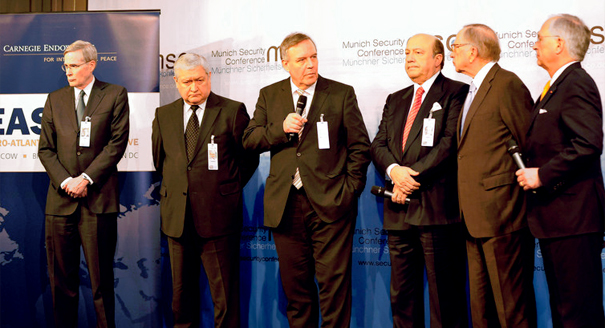
Frozen Conflicts Seen as Russia’s Door into “Euro-Atlantic Security Community” (Part Two)
Publication: Eurasia Daily Monitor Volume: 9 Issue: 29
By:

No authority in NATO has endorsed or in any way encouraged the Euro-Atlantic Security Initiative’s (EASI) proposals to introduce Russia into a redefined “Euro-Atlantic security community,” implying decision-making powers for Russia alongside the United States and European Union (see EDM, February 9). EASI is a high-profile group of Western (private) and Russian (government-employed) authors. This group’s Euro-Atlantic brand is not authentic, since there is nothing Euro-Atlantic about the group’s Russian members or about Russia’s qualifications to join the proposed community.
EASI presented its study with policy recommendations, “Historical Reconciliation and Protracted Conflicts,” to NATO at its annual Munich conference on February 3-4. A companion study by the same group, “Toward a Euro-Atlantic Security Community,” contains some of the same recommendations about the post-Soviet “frozen” conflicts and a new security order in the “Euro-Atlantic space” on three pillars: the US, EU, Russia. Both documents are being submitted for consideration at NATO’s summit in Chicago in May (EASI Working Group: “Historical Reconciliation and Protracted Conflicts” and “Toward a Euro-Atlantic Security Community,” https://www.carnegieendowment.org).
The recommendations envisage an entirely new setup for negotiations on the unresolved (post-Soviet “protracted”) conflicts. This would start an open-ended, apparently timeless process. EASI does not mention the goals or the underlying principles of this process. Instead, it presents the process itself as a means to another end – namely, to justify Russia’s inclusion as a major decision-maker in the re-ordered “Euro-Atlantic security community” that these authors imagine.
EASI proposes a “Stewardship of Cooperation” to consist of the EU, Russia, and the US. This trio would “accept the responsibility to develop a Joint Stewardship Plan for the Twenty-First Century, designed to produce functioning Euro-Atlantic security cooperation.” The triumvirate would officially announce this commitment at the OSCE. It would then beef up the OSCE’s staff and give it implementing responsibilities for the trio’s decisions. To maximize the leeway for action, the OSCE would abandon its consensus rule and “the EU would abandon its demand [sic] to speak with one voice.” Cautioning against a “competition between the EU and the OSCE,” EASI chooses the OSCE because Russia is there and is not in the EU.
According to the authors, “the Euro-Atlantic Security Community must endorse and defend the basic principle of respect for the rights of national minorities and individuals, as enshrined in the Helsinki Declaration.” EASI also points to conflict-settlement and reconciliation that followed the wars in ex-Yugoslavia. Those solutions, however, involved reversal of ethnic cleansing and prosecution of the main perpetrators. EASI’s own admonitions to reconciliation remain pure abstractions as long as the ethnic cleansing of Azeris and Georgians (on a far larger scale than occurred in the Balkans) remains unmentioned in EASI’s recommendations.
EASI proposes resorting to people-to-people contacts and social projects via non-governmental organizations, as a supplement to traditional state diplomacy in the four post-Soviet conflicts. It hopes that Russia would cover part of the funding for such NGO activities in the conflict areas. It alludes to a “Marshall Plan for Civil Society,” on a joint basis with Russia. How would this work in practice? In Transnistria, for example, the European Union has allocated some 13 million Euros ($17.15 million) for programs of that type in 2012 and will more than treble that amount in 2013. The purpose is European outreach to Transnistria, and Chisinau outreach to Tiraspol, at societal levels. Inserting Russian finances and organizations in those programs would change their nature and purpose.
On the whole, EASI seems to adopt an instrumental approach to the post-Soviet conflicts. A few individual members of the group probably feel otherwise, but the collective final product sees those conflicts as impediments to seating Russia at the table of Euro-Atlantic decisions. In this respect EASI’s study resembles the German-Russian initiative (“Meseberg Memorandum”), which envisages an eventual Russian role in EU decision-making, in return for Russian cooperation on Transnistria conflict-settlement. In both cases, exploring a new security order with Russia is the primary factor, whereas concern with the “frozen” conflicts is a secondary, derivative factor; a means to a larger end.
Thus, according to EASI, the “regional disputes in the area of the former Soviet Union” constitute a “serious obstacle to creating a security community in the larger Euro-Atlantic region,” they “threaten to undermine efforts to build Euro-Atlantic cooperation.” “If allowed to fester, these differences will severely damage prospects for security cooperation across the entire Euro-Atlantic region.” “Cooperative security processes [and] building a security community requires settlement of these protracted conflicts.” Echoing Meseberg (see above), EASI declares, “demonstrating in Transnistria that conflict-resolution is indeed possible could well be a stepping stone for the Euro-Atlantic Security Community” (“Euro-Atlantic” meaning West-Russia in EASI parlance).
Correspondingly, EASI’s recommendations on the frozen conflicts are process-oriented, not goal-oriented or principle-based. Mere process rather than results would apparently suffice to qualify Russia for “Euro-Atlantic” status.
“In so doing, the US and the EU would recognize Russia’s political and security role as a full Euro-Atlantic partner in addressing the issues of this space. Russia, for its part, would accept responsibility for a constructive neighborhood policy that contributes to the growth of sovereignty, of mutual respect among nations, and of civil society in this region. On this basis the three [EU, Russia, US] would dedicate themselves to pursuing coordinated initiatives to deal with existing conflicts.” However, nothing in the realm of experience would suggest that the Kremlin could qualify on those grounds.




